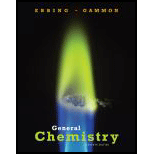
(a)
Interpretation:
The functional group present in the given compound has to be named and the IUPAC name of the same has to be written.
Concept Introduction:
In an organic compound, the reactive portion is known as functional group. This undergoes reactions with other reagents and this does not depend upon how the rest of the compound is like. Few of the common
Any organic molecule can be named by using certain rules given by IUPAC (International Union for Pure and applied chemistry). IUPAC name consists of three parts in major namely Prefix suffix and root word.
Prefix represents the substituent present in the molecule and its position in the root name.
Suffix denotes the presence of functional group if any in the molecule. It can be an
Root word represents the longest continuous carbon skeleton of the organic molecule.
To Identify and Write: The functional group present and IUPAC name of the given compound.
(b)
Interpretation:
The functional group present in the given compound has to be named and the IUPAC name of the same has to be written.
Concept Introduction:
In an organic compound, the reactive portion is known as functional group. This undergoes reactions with other reagents and this does not depend upon how the rest of the compound is like. Few of the common functional groups are alcohol, ester, carboxylic acid, ketone, aldehyde etc. Functional group determines the nature of the compound.
Any organic molecule can be named by using certain rules given by IUPAC (International Union for Pure and applied chemistry). IUPAC name consists of three parts in major namely Prefix suffix and root word.
Prefix represents the substituent present in the molecule and its position in the root name.
Suffix denotes the presence of functional group if any in the molecule. It can be an alkene, alkyne, alcohol, carboxylic acid, alcohol etc.
Root word represents the longest continuous carbon skeleton of the organic molecule.
To Identify and Write: The functional group present and IUPAC name of the given compound.
Want to see the full answer?
Check out a sample textbook solution
Chapter 23 Solutions
General Chemistry - Standalone book (MindTap Course List)
- Explain how the equation 4Fe(OH)2(s)+O2(g)→2Fe2O3(s)+4H2O(l) in the article illustrates the oxidation of the iron in the rectants.arrow_forwardIf you wanted to make something out of metal but didn't want it to rust, what are your options?arrow_forwardExplain how the equation 4Fe(OH)2(s) + O2(g)→2Fe2O3(s) + 4H2O(l) in the article illustrates the oxidation of the iron ions in the reactantsarrow_forward
- A Predict the major products of the following reaction. Be sure to use wedge and dash bonds to show the stereochemistry of the products when it's important, for example to distinguish between two different major products. + Cl₂ 2 X Click and drag to start drawing a structure.arrow_forwardC app.aktiv.com Predict reagents needed to complete this E2 elimination reaction. Br Problem 17 of 40 H3O+ A heat NaH B heat 0 D E (CH)COK heat CH₂ONa (CH)COH heat Donearrow_forwardPlease correct answer and don't use hand ratingarrow_forward
- Draw the structure of the product of this reaction. H CH2CH3 Br H-... H H3C KOH E2 elimination product • Use the wedge/hash bond tools to indicate stereochemistry where it exists. • If there are alternative structures, draw the most stable one. • If no reaction occurs, draw the organic starting material. O + 98 // n ?arrow_forward4. a) Give a suitable rationale for the following cyclization, stating the type of process involved (e.g. 9-endo-dig), clearly showing the mechanistic details at each step. H CO₂Me 1) NaOMe 2) H3O® CO₂Mearrow_forward2. Platinum and other group 10 metals often act as solid phase hydrogenation catalysts for unsaturated hydrocarbons such as propylene, CH3CHCH2. In order for the reaction to be catalyzed the propylene molecules must first adsorb onto the surface. In order to completely cover the surface of a piece of platinum that has an area of 1.50 cm² with propylene, a total of 3.45 x 10¹7 molecules are needed. Determine the mass of the propylene molecules that have been absorbed onto the platinum surface.arrow_forward
- Chem 141, Dr. Haefner 2. (a) Many main group oxides form acidic solutions when added to water. For example solid tetraphosphorous decaoxide reacts with water to produce phosphoric acid. Write a balanced chemical equation for this reaction. (b) Calcium phosphate reacts with silicon dioxide and carbon graphite at elevated temperatures to produce white phosphorous (P4) as a gas along with calcium silicate (Silcate ion is SiO3²-) and carbon monoxide. Write a balanced chemical equation for this reaction.arrow_forwardProblem Set 4a Chem 1411. A latex balloon is filled with a total of carbon dioxide gas so that its volume reaches 1.352 L. The balloon whose weight was originally 0.753 g, now weighs 2.538 g. How many molecules of carbon dioxide have been added to the balloon?arrow_forwardQ18. 30 minutes left please help!!arrow_forward
 Introductory Chemistry: An Active Learning Approa...ChemistryISBN:9781305079250Author:Mark S. Cracolice, Ed PetersPublisher:Cengage Learning
Introductory Chemistry: An Active Learning Approa...ChemistryISBN:9781305079250Author:Mark S. Cracolice, Ed PetersPublisher:Cengage Learning Chemistry for Today: General, Organic, and Bioche...ChemistryISBN:9781305960060Author:Spencer L. Seager, Michael R. Slabaugh, Maren S. HansenPublisher:Cengage Learning
Chemistry for Today: General, Organic, and Bioche...ChemistryISBN:9781305960060Author:Spencer L. Seager, Michael R. Slabaugh, Maren S. HansenPublisher:Cengage Learning- Chemistry: Matter and ChangeChemistryISBN:9780078746376Author:Dinah Zike, Laurel Dingrando, Nicholas Hainen, Cheryl WistromPublisher:Glencoe/McGraw-Hill School Pub Co
 Chemistry: Principles and ReactionsChemistryISBN:9781305079373Author:William L. Masterton, Cecile N. HurleyPublisher:Cengage Learning
Chemistry: Principles and ReactionsChemistryISBN:9781305079373Author:William L. Masterton, Cecile N. HurleyPublisher:Cengage Learning Organic ChemistryChemistryISBN:9781305580350Author:William H. Brown, Brent L. Iverson, Eric Anslyn, Christopher S. FootePublisher:Cengage Learning
Organic ChemistryChemistryISBN:9781305580350Author:William H. Brown, Brent L. Iverson, Eric Anslyn, Christopher S. FootePublisher:Cengage Learning





